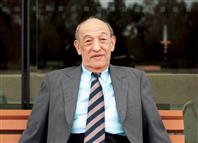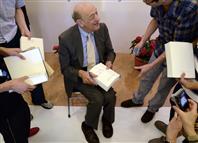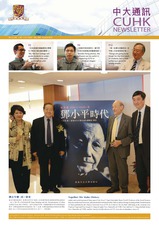To promote communication and exchange between China and the West has for many years been one of the core missions of CUHK. Today, with the world a global village, how do you see the Chinese University hold itself with the fast disappearance of the East-West divide?
Hong Kong, and CUHK, have certainly played their respective historical parts in opening up China to the West, and in speeding up modernization in China. The role of the University in the 1970's and 1980's was particularly significant and unique, and today it continues to be so, albeit with some changes in emphasis. Western scholars still find this a very welcoming place where they feel being parts of the community rather than as guests, the University itself is now a lot more international than before, and as Hong Kong will integrate more and more with the Pearl River Delta, not only commercially but also intellectually, CUHK will develop itself into a major hub of cultural activities in the region.
Could you tell us how your interest in the study of Asia, especially China and Japan, came to be formed? We understand that your doctoral thesis, supervised by Talcott Parsons, was on quite another subject.
Yes my original interest was in the sociological study of the family. But it was a time, in the post-McCarthy era, when a great interest in China and Japan was developing in the United States, and Harvard was at the forefront of this renewed intellectual urge to learn more about Asia. So I moved into the field of Asian studies, learnt Chinese and Japanese, and, in the process, had a lot of encouragement and support from pioneer scholars like John Fairbank, whom I later succeeded as director of the East Asian Research Centre at Harvard.
You have just released the long-anticipated Chinese edition of your opus magnum on Deng Xiaoping. Could you highlight for us the most important merits of Deng and the aspects of his government for which he will be the most remembered?
After the devastations of the Cultural Revolution, which left the people of China purloined and slowed down their links with the outside world, Deng brought the country back to order and productiveness. He was not the only leader who stood for reform at the time, nor did he have a clearly mapped out blueprint for reforms. He learnt from history, and in particular he learnt the necessity of managing the country well. He would not allow ideological controversies to tear the country apart, and placed great emphasis on keeping the people fed, and in due course improving their livelihood through economic reforms.
Deng's achievements were built upon the experience he gained over a long career in which he had tried his hand in every major aspect of state governance. Apart from his outstanding political acumen, his credentials included being a revolutionary hero, a brilliant soldier, a shrewd finance minister, as well as an effective head of regional government. Among Chinese leaders of his generation he had a rare gift of building up rapport with foreign heads of state, including Presidents Ford, Carter, Reagan, and Bush Senior, and Lady Thatcher too, just to name a few. He was on good terms with Hong Kong dignitaries such as Sir Y. K. Pao and Lord Maclehose. He probably impressed with his practical and down-to-earth approach: President Reagan was known to have observed that Deng did not look like a communist at all.
To what extent are the policies and directions set by Deng still being followed in China?
I think his basic policies are still being followed. This may be seen in terms of continued economic reforms, the emphasis on the development of science and technology, the appointment of younger people to key government positions, the importance accorded to merit and the examination system, and the general policy of getting on with other powers.
Would you care to say a few words about the political scene in Hong Kong, and the Central Government's view as to what is going on here?
Let us say that there is now considerable difference between Hong Kong and the Mainland, as compared to the time Deng Xiaoping was alive, in terms of affluence and wealth. Now the Mainland is much richer by comparison, and prices in Hong Kong are being driven up partly as the result of the Mainland's economic success, and the Mainlanders’ purchasing power. Peaceful and stable development in Hong Kong in the long term is what the Central Government prefers. Let us say that Headquarters will always keep a watchful eye, and there would be concessions here and there. It would also be well for us to remember that the rule of law, and the concepts behind an institution like the ICAC in Hong Kong, are only beginning to take shape in many parts of the Mainland and this fact may have overwhelmed some people in Hong Kong. 




































































































































































Social Bookmarks